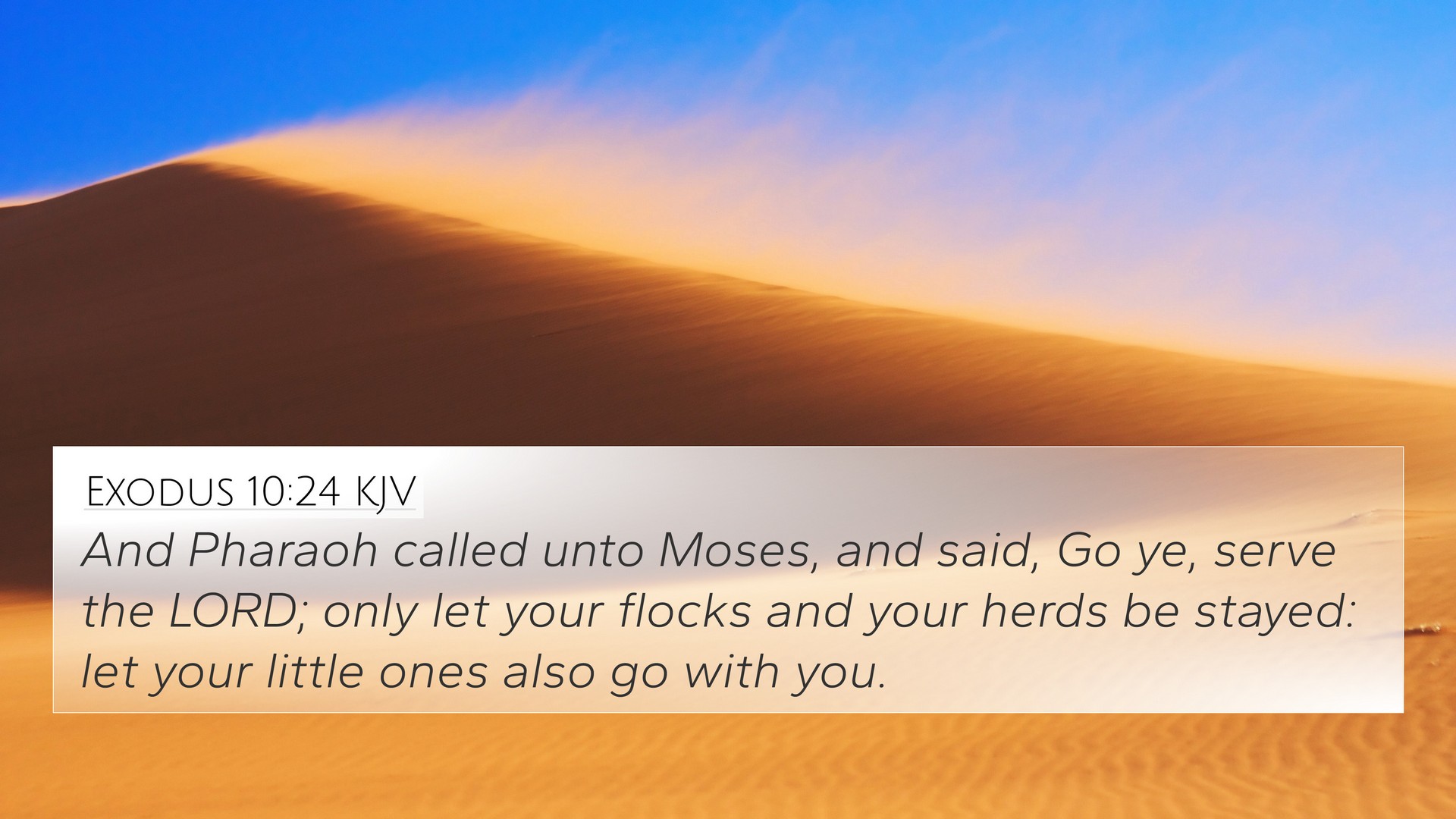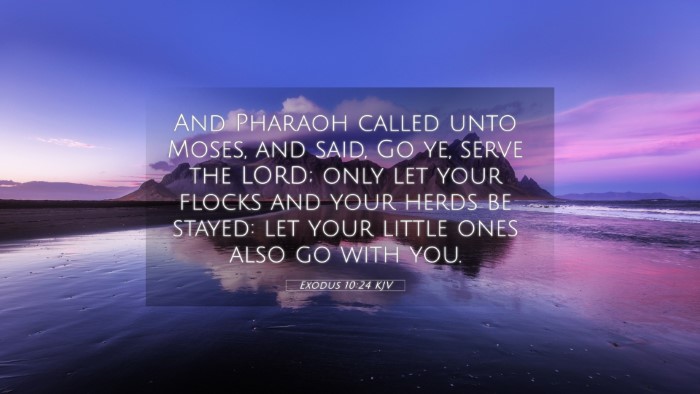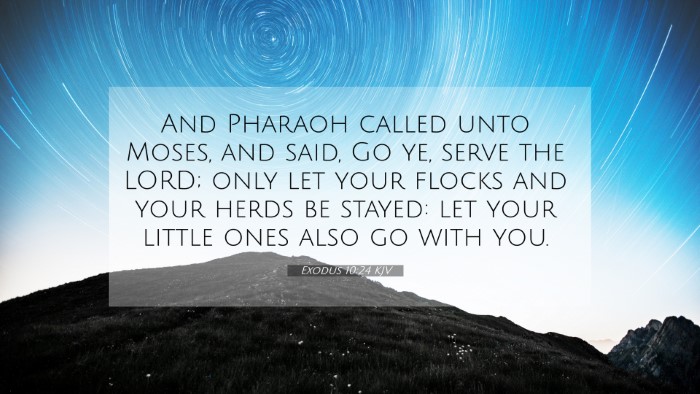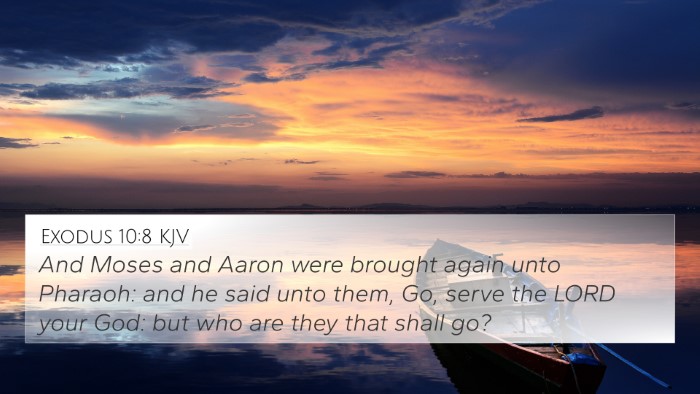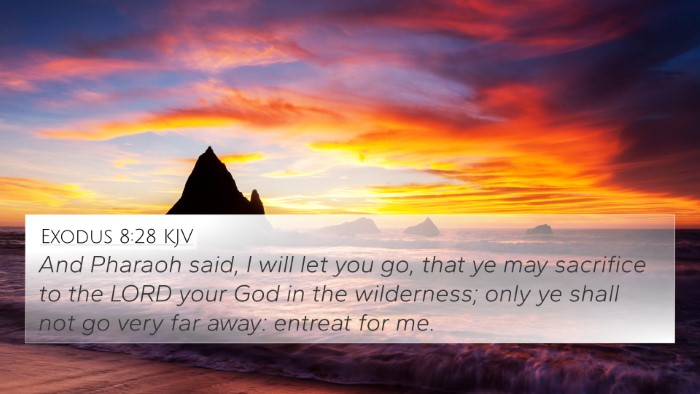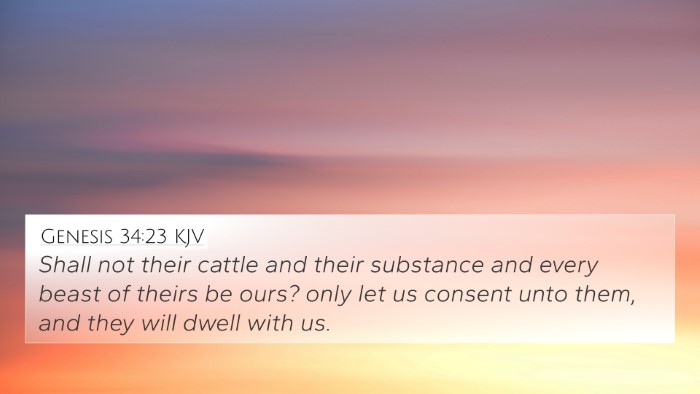Exodus 10:24 - Summary and Interpretation
Verse: "Then Pharaoh called Moses and said, 'Go, serve the LORD; only let your flocks and your herds be left behind. Even your little ones may go with you.'" (Exodus 10:24)
Meaning and Insights
This verse occurs during the climactic moments of the plagues in Egypt, which showcase the struggle between Moses, representing God’s will, and Pharaoh, representing disobedience. Pharaoh, after experiencing immense suffering from the plagues, seeks to negotiate terms with Moses for the Israelites' departure. This interaction paints a profound picture of negotiation, power, and the consequences of sin.
Commentary Insights
- Matthew Henry: He emphasizes Pharaoh's continued resistance and how his heart remains hardened despite evident divine power. Henry notes that Pharaoh's attempts at negotiation reveal a deep internal conflict, as he wishes to maintain control while bowing to the divine order. The permission to leave while withholding their livestock symbolizes a desire to keep a part of their lives tied to Egypt.
- Albert Barnes: Barnes reflects on the psychological and spiritual dynamics at play. He notes that Pharaoh's condition demonstrates humanity's reluctance to fully surrender to God's will. Pharaoh accommodates the request partially but tries to retain control, suggesting that many people struggle to fully commit to following divine guidance while wanting to keep old attachments.
- Adam Clarke: Clarke highlights the significance of the flocks and herds in the context of the Israelites' worship and sacrifice. He considers that Pharaoh's suggestion to leave them behind implies an understanding that the Israelites intended to worship God away from Egypt. Clarke points out this negotiation underscores a lack of genuine repentance on Pharaoh's part.
Cross-References and Thematic Connections
The themes of negotiation, control, and spiritual surrender in Exodus 10:24 can be linked to various scripture passages that enhance its understanding.
- Exodus 8:25: Pharaoh’s words to Moses show a similar tug-of-war concerning the plagues and the worship of God.
- Exodus 9:27-28: This scripture highlights Pharaoh’s acknowledgment of sin yet his unwillingness to fully commit.
- Exodus 3:18: Where Moses first outlines God’s command to Pharaoh, establishing a precedent for the demands to worship.
- Exodus 12:31: Pharaoh finally giving in to let the Israelites go points towards the ultimate surrender to Yahweh's command.
- 1 Kings 18:21: The theme of choosing between two paths reflects the indecision displayed by Pharaoh.
- Romans 6:16: This New Testament counterpart examines the importance of yielding to divine authority—echoing the struggle of Pharaoh.
- Hebrews 11:27: This passage reflects the faith necessary to leave behind worldly attachments, akin to what Moses advocated.
- Psalm 105:26-38: A recount of God’s mighty acts concerning His people that further explains the context of their deliverance.
- Acts 7:36-37: This verse references Moses leading the Israelites out of captivity, connecting the original exodus to the apostles’ message.
- Revelation 18:4: This New Testament warning encourages followers to leave behind the bondage of sin, akin to the Israelites leaving Egypt.
Thematic Analysis Through Cross-Referencing
The connections between Exodus 10:24 and the aforementioned verses allow for a deeper understanding of key themes. The persistent reluctance of Pharaoh aligns with many biblical teachings on the nature of sin and the struggle against recognizing God’s authority. This comparative analysis helps draw broader themes of worship, obedience, and redemption throughout scripture.
Tools for Bible Cross-Referencing
Utilizing tools for Bible cross-referencing can enhance the study of themes found in passages like Exodus 10:24.
- Bible Concordance: Look up key terms to find related verses that share thematic ties with this scripture.
- Bible Cross-Reference Guide: Consult guides that offer insights on similar stories or concepts in both the Old and New Testaments.
- Cross-Reference Bible Study: Employ methods that systematically link verses for a more holistic understanding of biblical narratives.
Application in Study and Sermon Preparation
Understanding the complexities of Exodus 10:24 through cross-referencing can greatly benefit sermon preparation and personal study.
- Cross-Referenced Themes: When preparing teachings, recognize that themes of obedience and God’s sovereignty resonate throughout the Bible, showing readers the importance of surrender.
- Interpreting Biblical Themes: Use thematic connections not just for analysis but also to apply lessons from Exodus in contemporary contexts.
Conclusion
Exodus 10:24 serves as a powerful reminder of the struggle between divine obedience and human resistance. Through careful analysis and cross-referencing, the complex relationship between God’s commands and human responses unfolds, reflecting a timeless truth relevant both in the narrative of Exodus and in today’s life.
